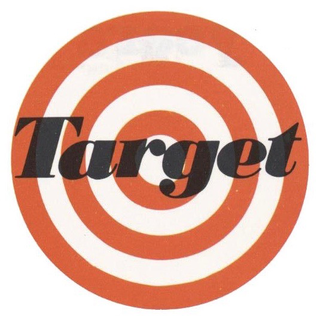Related Research Articles
Mervyn's was an American middle-scale department store chain based in Hayward, California, and founded by Mervin G. Morris (1920–2021). It carried national brands of clothing, footwear, bedding, bath products, furniture, jewelry, beauty products, electronics, toys, and housewares. Many of the company's stores were opened in shopping malls; however, some locations were operated independently. Based on 2005 revenue, Mervyn's was the 83rd largest retailer in the United States.
Marshall Field & Company was an upscale department store in Chicago, Illinois. Founded in the 19th century, it grew to become a large chain before Macy's, Inc, acquired it in 2005. Its founder, Marshall Field, was a pioneering retail magnate.
The J. L. Hudson Company was an upscale retail department store chain based in Detroit, Michigan. Hudson's flagship store, on Woodward Avenue in Downtown Detroit, was the tallest department store in the world in 1961, and, at one time, claimed to be the second-largest department store, after Macy's, in the United States, by square footage.
Dayton's was an American department store chain founded in Minneapolis, Minnesota, in 1902 by George Draper Dayton. It operated several local high-end department stores throughout Minnesota and the Upper Midwest for almost 100 years. Although it was regionally known as a high-quality shopping destination, Dayton's is best remembered for starting the discount shopping chain Target. The company was also instrumental in the history of shopping malls, opening the first indoor shopping mall in the United States—Southdale Center in Edina, Minnesota, in 1956.

Southdale Center is a shopping mall located in Edina, Minnesota, a suburb of the Twin Cities. It opened in 1956 and is the first fully enclosed, climate-controlled shopping mall in the United States. Southdale Center has 1,297,608 square feet of leasable retail space, and contains 106 retail tenants. The mall is owned by Simon Property Group and the anchor stores are Macy's, Dave & Buster's, AMC Theatres, Hennepin Service Center, and Life Time Athletic.

British American Tobacco US, mostly known for its acronym BATUS, was the United States subsidiary of multinational company British American Tobacco (BAT), the world's second largest cigarette manufacturer. BATUS served as the U.S. holding company for BAT. In the 1960s, the company diversified into areas such as insurance, drink, and retail.

Lechmere was a Massachusetts-based chain of retail stores that closed in 1997. At the time of its closing, it had 27 stores, including 20 in New England. The chain offered electronics, appliances, and various household goods. It also had locations in New York and the Southeastern United States.

B. Dalton Bookseller was an American retail bookstore chain founded in 1966 by Bruce Dayton, a member of the same family that operated the Dayton's department store chain. B. Dalton expanded to become the largest retailer of hardcover books in the United States, with 779 stores at the peak of the chain's success. Located mainly at indoor shopping malls, B. Dalton competed primarily with Waldenbooks. Barnes & Noble acquired the chain from Dayton's in 1987 and continued to operate it until a late 2009 announcement that the last 50 stores would be liquidated by January 2010. B. Dalton was later revived by rebranding a Barnes & Noble location in 2022.

Associated Dry Goods Corporation (ADG) was a chain of department stores that merged with May Department Stores in 1986. It was founded in 1916 as an association of independent stores called American Dry Goods, based in New York City.
Apache Mall is a shopping mall in Rochester, Minnesota, United States. Apache Mall is owned and managed by Brookfield Properties, who acquired General Growth Properties in 2018. The mall's anchor stores are Scheels All Sports, Barnes & Noble, Macy's, and JCPenney. Boston Shoe & Boot Repair, Orangetheory Fitness, and Men's Wearhouse are junior anchors. There is 1 vacant anchor store that was once Herberger's.

Burnsville Center is located in Burnsville, Minnesota. It is one of the larger enclosed malls in Minnesota with 100 stores on 3 floors and approximately 1,100,000 square feet (100,000 m2). The mall opened in 1977 with three anchor stores, Sears, Dayton's, and Powers Dry Goods as anchors.

Ron Johnson is the CEO and founder of Enjoy Technology. Previously, he was CEO of JCPenney, where he led a failed effort to fundamentally reshape the retailer; senior vice president of retail operations at Apple Inc., where he developed the concept of the Apple Retail Stores and the Genius Bar; and the vice president of merchandising for Target Corporation, where he was credited for making the store appeal to a younger and trendier crowd. Johnson is on the Board of Directors of Globality Inc, a start-up based in Menlo Park, California.

Ridgedale Center, colloquially known as Ridgedale, is an enclosed shopping mall in Minnetonka, Minnesota, a western suburb of the Twin Cities. It is directly located off I-394/US 12 between Ridgedale Drive and Plymouth Road. Ridgedale Center comprises 1,105,337 square feet (100,000 m2) of leaseable retail space, and contains approximately 140 retail tenants. It is currently jointly owned by Brookfield Properties and CBRE Group, and managed by Brookfield. The anchor stores are JCPenney, Nordstrom, Macy's, and Dick's House of Sport.
Shingle Creek Crossing, formerly Brookdale Center, is a regional shopping mall in Brooklyn Center, Minnesota. It became the third enclosed shopping mall in the Twin Cities, after Southdale Center and Apache Plaza. The mall opened in phases beginning with Phase One in March 1962 which included anchor stores Sears and JCPenney. Phase Two opened in 1966, adding Dayton's as the third anchor. Donaldson's became the fourth anchor in September 1967. Brookdale Center was part of "The Dales", what was referred to as the four "Dale" centers circling the Twin Cities, originally developed by Dayton-Hudson Corporation. The others are Southdale Center in Edina, Rosedale Center in Roseville and Ridgedale Center in Minnetonka. After a long decline, the mall closed in 2010 and was demolished in 2012 before being redeveloped into the Shingle Creek Crossing development.

Rosedale Center, commonly known just as Rosedale, is a shopping center in Roseville, Minnesota. The mall is surrounded by suburbs and close to major highways and serves a trade area population almost 2 million people, and boasts 14 million visitors annually.

Target Corporation is an American retail corporation that operates a chain of discount department stores and hypermarkets, headquartered in Minneapolis, Minnesota. It is the seventh-largest retailer in the United States, and a component of the S&P 500 Index. The company is one of the largest American-owned private employers in the United States.
John Francis Kilmartin Jr. was the chief executive officer of Mervyn’s Department Stores.
Douglas James Dayton was an American retail executive, businessman, and philanthropist and heir to the Dayton's Company fortune who was the co-founder of the Target discount stores chain. Dayton ran Target's operations during its early years and served as the company's first president. He started his career at the family company: Dayton's department stores.

The history of Target Corporation first began in 1902 by George Dayton. The company was originally named Goodfellow Dry Goods in June 1902 before being renamed the Dayton's Dry Goods Company in 1903 and later the Dayton Company in 1910. The first Target store opened in Roseville, Minnesota in 1962, while the parent company was renamed the Dayton Corporation in 1967. It became the Dayton-Hudson Corporation after merging with the J.L. Hudson Company in 1969 and held ownership of several department store chains including Dayton's, Hudson's, Marshall Field's, and Mervyn's. In 2000, the Dayton-Hudson Corporation was renamed to Target Corporation.
Bruce Bliss Dayton was an American retail executive, businessman, heir to the Dayton's Company fortune, and philanthropist.
References
- ↑ Discount Store News, via FindArticles: "Bob Ulrich, Chairman, CEO," last retrieved December 5, 2006.
- ↑ Answers.com: "Robert J. Ulrich: Information," last retrieved December 5, 2006.
- ↑ "Target CEO Bob Ulrich to retire". NBC News. Retrieved May 27, 2022.